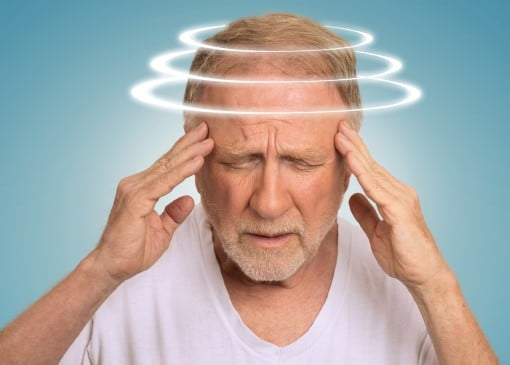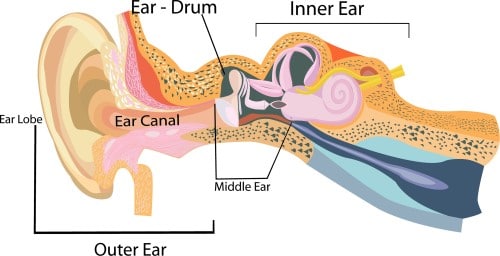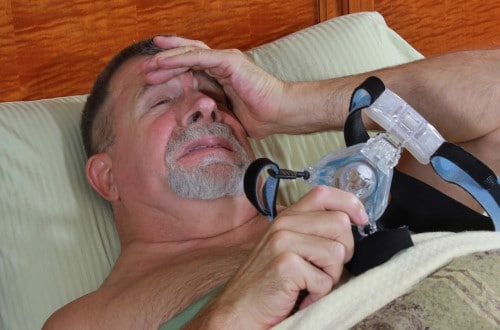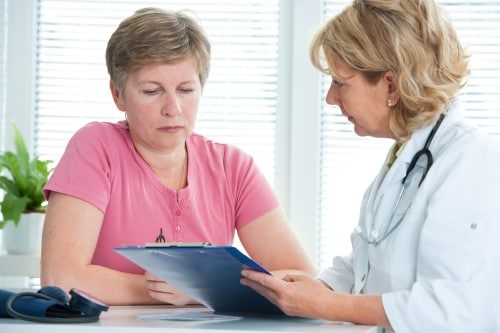
Sleep apnea and dizziness: What we know and 7 things you can try
By Jason Wooden, PhD
Sleep apnea and dizziness together can make a bad situation worse. Dizziness is often associated with other health issues, including sleep apnea. Some patients may also experience symptoms when first starting CPAP or if their pressure settings are changed.
It’s important to work with a doctor to make sure your sleep apnea is under control. They can also make changes to your CPAP settings if needed or help you find a different treatment. Lastly, they can check for other causes for your dizziness.
Sleep apnea and dizziness together means more misery
So, you’re wondering about sleep apnea and dizziness?
Or maybe, it’s bouts of vertigo…
We’ve all felt dizzy at one time or another, that feeling of light-headedness or disorientation. Vertigo is more severe form of dizziness in which you feel like the room is spinning.
Symptoms typically last from a few minutes to hours.
And whether it’s dizziness or vertigo, it’s one of the most common symptoms reported to doctors. It affects over 90 million Americans and for 4 in 10 it’s severe enough to send them to a doctor.
Dizziness and vertigo are often associated with other common health issues such as migraine headaches, motion sickness, faints, and anxiety. They have also been linked to poor sleep.
And that’s a problem for millions insomnia sufferers and sleep apnea patients.
Sleep apnea by itself is bad enough. Throw in a douse of dizziness or vertigo into the mix and the misery index goes way up.
Are you noticing that you’re having bouts of dizziness along with your sleep apnea? Have you started CPAP treatment and for the first time wake up feeling lightheaded?
Let’s talk about what we know and what you can do for sleep apnea and dizziness.

What do we know about dizziness?
Before we talk about sleep apnea and dizziness, let’s get the basics out of the way….
We’ve already said that dizziness is when you feel lightheaded or disoriented, vertigo is when the room is spinning. It turns out that both can involve inner ear problems.
There are many causes which include:
- circulation problems
- medications
- ear infections
- ear injuries
- neurological problems such as Parkinson’s
- anxiety disorders
- low iron levels
- low blood sugar
- overheating, dehydration
- balance disorders such as vestibular neuritis and Meniere’s disease
Did you know that changes in air pressure has also been linked to dizziness?
It may also be the reason why people experience vertigo during weather changes.
Which brings us to an interesting connection to sleep apnea…
Is it dizziness or vertigo?
Dizziness: light-headedness or disorientation
Vertigo: the room is spinning

Is there a link between sleep apnea and dizziness?
Sleep apnea involves interruptions in airflow to the body during sleep. For most, it’s due to collapse of the airway (obstructive sleep apnea) while for some the brain doesn’t correctly signal the muscles that control breathing (central sleep apnea).
Regardless, it possible the airflow interruptions could be messing with the air pressure in the ear.
It’s not unheard of for sleep apnea patients to experience severe dizziness in the morning.
Sleep apnea has been linked to dizziness in clinical studies.
In one study, patients with moderate-to-severe obstructive sleep apnea were found to have more dizziness symptoms.
More recently, Taiwanese researchers reported the results of a study involving over 25,000 people. They found that sleep apnea patients experience significantly more vertigo.
Do we know for sure this is being caused by air pressure changes?
It’s hare to say since more research needs to be done to tease out exactly what’s going on. You may simply be dizzy because your brain has been starved of oxygen during the night.
(Looks like there’s a study planned to look more into this.)
One thing we do know now is that there’s definitely a link between sleep apnea and dizziness.
The other thing you should keep in mind that are the many different causes for dizziness, but it’s still possible that sleep apnea could be causing or worsening your symptoms.

What about CPAP and vertigo?
Right now, some of you are probably wondering about the link between CPAP and vertigo if your symptoms started at the same time as your sleep apnea treatment.
You aren’t the first as other people have complained of this.
CPAP, continuous positive air pressure, is one the most common and effective treatments for sleep apnea. It involves pumping extra air through a face mask to open up the airway and improve the flow of oxygen to the body.
Could this extra air be causing pressure changes that lead to dizziness or vertigo?
CPAP use has been linked to increases in air pressure in the ear. The positive air pressure is believed to travel through the eustachian tube into the middle ear and cause problems.
(The eustachian tube is a canal that connects the middle ear to the upper part of the throat behind the nose.)
While changes in air pressure have been linked to vertigo attacks for patients with an ear disorder, it’s hard to say whether this is what is happening when you hook up to your cpap machine.
Again, this is another area that hasn’t been well studied.
So, it’s possible this may be what’s causing your vertigo, but we don’t know for sure.

So, what can we do about sleep apnea and dizziness?
When dealing with sleep apnea and dizziness, it’s a good idea to work with a doctor since so many different things could be at play.
They can check for other causes besides sleep apnea and recommend a treatment based on your symptoms.
For example, they may give you antibiotics if they find that your ear is infected. Or maybe figure out that one of your meds is making things worse and help you find something better.
Here’s are some of your options:
1) See a sleep specialist
Since sleep apnea has been linked to dizziness, you should also see a sleep specialist if it’s not under control. Better oxygen flow to the brain during the night may help you feel less lightheaded in the morning.
If your problems started with CPAP use, they may be able to adjust your pressure settings. If that fails, a sleep doc can help you find a different sleep apnea treatment that doesn’t involve pumping air into you.
Your options include body positioners, new innovative nerve stimulators, and surgically implanted suspension lines.
2) Medications
A doctor may prescribe you a drug that relieves vertigo and dizziness. There are also over-the-counter options.
3) Epley maneuver
Done by a doctor or specialist, it involves moving the head to dislodge crystals in the ear that may be causing be causing dizziness.
4) Balance therapy (vestibular rehabilitation)
A physical therapist helps you learn specific exercises to make your balance system less sensitive to motion and dizziness.
5) Psychotherapy
Psychotherapy counseling may help people whose dizziness is caused by an anxiety disorder.
6) Injections
A doctor may inject an antibiotic or steroid into the inner ear to disable the balance function and relieve dizziness symptoms.
Some dizziness remedies shared by CPAP users in online forums:
- Went away a couple hours after getting up
- Went for physical therapy which helped, but still get vertigo when sitting up or laying down
- Had vitamin D levels checked and they were low, felt better after taking supplement
- Symptoms went away as sleep improved
- Reduced air pressure and vertigo went away

Natural remedies to help with sleep apnea and dizziness
We’ve talked a lot about the things you can do with the help of a doctor and specialists. There are also other remedies that may help with your sleep apnea and dizziness.
Water:
Dehydration can cause dizziness, so try drinking more water and staying hydrated. Learn more
Ginger tea:
Ginger may help relieve dizziness symptoms. Learn more
Vitamins:
Deficiencies in some vitamins may lead to dizziness. In some cases, eating more foods rich in vitamin C, E, and D may help. Learn more
Essential oils:
Some people have found that essential oils may help. You can try ginger, peppermint, lavender, and lemon oil. Learn more
Yoga:
Yoga can help patients suffering from vestibular disorders reduce dizziness and regain balance. Learn more
Tai chi:
Tai chi is an ancient Chinese martial art with many health benefits. It may help patients who suffer from dizziness and balance disorders. Learn more
Acupuncture:
Acupuncture is an ancient Chinese healing art that involves inserting thin needles into the body at specific points. It’s been found to be effective treatment for dizziness and vertigo. Learn more
Sleep apnea and dizziness resources
Facts and definition of dizziness (eMedicineHealth)
Dizziness and vertigo diagnosis (Vestibular Disorders Assoc.)
How to find the right ear specialist (Verywell Health)
Preparing for your doctor’s appointment (Vestibular Disorders Assoc.)
Treatment for vertigo, imbalance, and dizziness (Vestibular Disorders Assoc.)
What to remember about sleep apnea and pain:
- Dizziness is associated with many health conditions, including sleep apnea
- Work with a sleep specialist to make sure your sleep apnea is under control
- If CPAP is making you dizzy, try changing your air pressure settings or a different treatment
- See a doctor to check for other causes for your dizziness
Sources:
1. “Dizziness Can Be a Drag”, 2012, NIH website
2. Vertigo: A Review of Common Peripheral and Central Vestibular Disorders, Ochsner J. 2009 Spring;9(1):20-6.
3. The Epidemiology of Vertigo, Dizziness, and Unsteadiness and Its Links to Co-Morbidities, Front Neurol. 2013; 4: 29.
4. Relationship between sleep quality and dizziness, PLoS One. 2018 Mar 7;13(3):e0192705.
5. Barometric pressure and the incidence of benign paroxysmal positional vertigo, Am J Otolaryngol. 2019; 40(5):641-644.
6. “Dizziness and Vertigo”, MedlinePlus website
7. Vestibular functions were found to be impaired in patients with moderate-to-severe obstructive sleep apnea, Laryngoscope. 2015;125(5):1244-8.
8. Sleep apnea and risk of vertigo: A nationwide population-based cohort study, Laryngoscope. 2018 Mar;128(3):763-768.
9. “The Scary Effects of Sleep Apnea on the Brain”, 2018, CPAP.com website
10. “Is Middle Ear Pressure Affected by Continuous Positive Airway Pressure Use?”, 2018, ENTtoday website
11. The Effect of Continuous Positive Airway Pressure on Middle Ear Pressure, Laryngoscope. 2013 May;123(5):1300-4.
12. Atmospheric Pressure and Onset of Episodes of Menière’s Disease – A Repeated Measures Study, PLoS One. 2016; 11(4): e0152714.
13. “Tai Chi May Be An Effective Treatment For Dizziness, Balance Issues”, 2009, ScienceDaily website
Connect with us:
About Us
Better Sleep Simplified® was founded as a place for you to get clear and well-researched information.
Our goal is to make sure you know about your options so that you take action sooner rather than later.
Check us out on YouTube:
Watch and Learn
Helpful sleep tips, interesting sleep facts and statistics you want to know about
Affiliate Disclosure
This site is a participant in the Amazon Services LLC Associates Program and other affiliate advertising programs designed to provide a means for sites to earn advertising fees by advertising and linking to them.
Important: BetterSleepSimplified.com is for informational purposes only and is not intended or implied to be a substitute for professional medical advice, diagnosis, or treatment. Always consult a physician for sleep and health concerns. See additional information.


